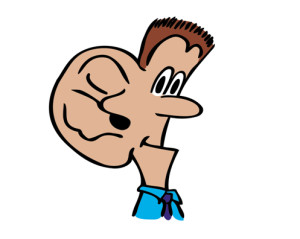Tinnitus and the Causes of Tinnitus
Let’s start by defining what tinnitus actually is.
Tinnitus is actually defined as the perception of sound when there is no external source present. While most people think of tinnitus as ringing in the ears, the noise can also be a hiss, a buzz, a roar, a click or any other sound. The noise may be continuous or it may occur intermittently. It may be pulsatile (throbbing) or constant and its pitch may be high or low.

(Tinnitus is a Symptom not a Disease)
What are some of the common causes of tinnitus in the first place?
The reason behind tinnitus may vary from anatomical abnormalities, disease, changes in biochemistry, injury, changes in perception, medication or simply wear and tear. According to the research, a common reason for tinnitus is inner ear cell damage.
Inside the inner ear tiny, delicate hairs move in relation to the pressure of sound waves. These changes in pressure triggers ear cells to release an electrical signal through a nerve from your ear to your brain, this is called the auditory nerve. Your brain then perceives these signals as sound. If for whatever reason the hairs inside your inner ear are bent, broken or damaged they can send off random electrical signals to your brain, triggering tinnitus.
Regardless of how we developed tinnitus in the first place, it’s the way we handle and cope with tinnitus emotionally that determines our quality of our life. That is unless there is an obvious cause for your auditory discomfort, in which case it can be dealt with immediately. Such as an adjustment to a medication, the clearing up of an infection or the removal of an obstruction such as impacted wax.
For your interest here is a basic list of health problems, injuries or conditions that may affect the nerves in your ear or the hearing center in your brain.

Age-related hearing loss. Like everything else in the body, as we age we are more susceptible to wear and tear and our hearing isn’t exempt from this. Hearing loss can be one of the reasons for tinnitus the medical term for this type of hearing loss is presbycusis.
Noise damage or Exposure . Sudden exposure to loud noise such as that from a firearm or a constant exposure to a loud noise, such as that from loud mechanical equipment, can cause irreversible damage. Portable music devices can also cause noise-related hearing loss. Ringing in the ears caused by exposure to loud music concerts usually goes away within a day or so, however long-term exposure to loud music or sounds can cause permanent damage, so air on the side of caution and protect your hearing at all times!
Blockage. This problem is most commonly in the form of earwax. Earwax protects your ear canal by trapping dirt and slowing the growth of bacteria. Sometimes too much earwax can accumulate and it can become impacted. This in turn can cause hearing loss or irritation, which can be one of the causes of tinnitus.
Anatomical. changes An example of this might be in the form of the Stiffening of the bones in your middle ear (otosclerosis) this may affect your hearing and cause tinnitus.
Medication. Believe it or not many prescription and nonprescription medicines can cause ringing in your ears (tinnitus).
A few examples are:
• Aspirin, ibuprofen and naproxen
• Some blood pressure and heart medicines
• Some antidepressants
• Some cancer medicines
Talk to your doctor if you think this might be the cause of tinnitus
Tinnitus can be caused by:
Meniere’s disease . Tinnitus accompanies Meniere’s disease, which is an inner ear disorder of idiopathic origin. What we do know is that it may be caused by abnormal inner ear fluid pressure.
Head, face, neck injuries. Trauma to the head, neck and face can have an affect on the inner ear. However these injuries usually only cause tinnitus in one ear.
TMJ disorders . The temperomandibular joint is a joint on each side of your jaw attaching the lower jaw to the skull. Problems with this joint have been known as one of the causes of tinnitus.
Acoustic neuroma is a noncancerous tumor, which develops on the cranial nerve, this nerve runs from your brain to your inner ear and controls balance and hearing. This condition also generally only causes tinnitus in one ear.
Blood vessel disorders . One of the reasons behind tinnitus in very rare cases is caused by a blood vessel disorder this type of tinnitus is called pulsatile tinnitus.

There is a Solution
Once you and your GP have narrowed down the likely reason for the cause of your tinnitus and unless it’s something that can be treated right away like a blockage, infection or medication adjustment. The fact remains, you have tinnitus, it’s stressful, emotionally traumatic and there is no sure fire solution. The next question that needs to be asked is…what am I going to do about this tinnitus?
Get your Tinnitus Retrain System copy now!!

